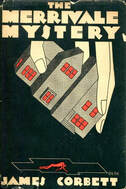
As I have always had an affinity for the earnest but incompetent genre story, likely in part from an adolescence spent absorbing the wonderfully terrible movies featured on Mystery Science Theater 3000, I wanted to try James Corbett. I was not disappointed, which is to say that I was thoroughly expecting disappointment in the conventional sense. But what makes this author's work so notably bad? I can't state it any more succinctly and accurately as Mr. Deeck does here, so I offer this quote:
There are certain types of readers to whom Corbett will not appeal. He should be avoided by those who like fine writing; by those who appreciate good description; by those who enjoy characterization and who think it helpful to be able to tell the characters apart; by those who do not appreciate non sequiturs or the almost-right word; by those who think real clues are essential in a mystery; by those who want detection and fair play; and by those who expect a writer to remember what he has written just a page before.
Here we have brilliant detective Victor Serge, brought in to investigate the murder of Sir Philip Merrivale of Merrivale Hall. The reader is reminded repeatedly that Serge is "famous", "brilliant", and "an agent of Justice", and perhaps we should be reminded of this, since the great man doesn't really do anything to prove his reputation. Certainly he will solve the mystery (after two more murders occur in exactly the same fashion, with a family member alone in the library killed by a revolver shot to the head through an open terrace door), but his methods of deduction are head-scratchingly incomplete. As Bill Deeck writes, it's tempting to just quote the entire Corbett book and be done with it, but here is one passage that shows the unintentionally comical prose which courses through the entire novel. The author has provided his detective with a sort-of Watson, a credulous and rather ineffective novelist (!) named Ralph Moreton:
Moreton, fascinated by the scene, made no effort to speak, but his brain surged with a thousand ideas. He still watched every movement, saw Serge's wonderful instruments pass over the body, the magnetic lens and gleaming microscope, the powerful hand-torch and measuring tape. During the inspection, Moreton knew he was watching a genius. He saw it in the systematic method of the examination, in every movement of those limbs, in every flash from Serge's eye.
"The words were pregnant with meaning, and Serge noted them carefully. What was the pact between these two? Why did they comprehend each other so thoroughly? Were they in league? Was Sybil the helpless agent of this evil genius? Was this helpless, spine-stricken invalid a devil incarnate? Were all these horrible things emanating from his brain?"
 Vampire of the Skies (1932)
Vampire of the Skies (1932) (End of Spoiler.) So, if you pick up a James Corbett mystery, this is what you're in for. Me? I find it amusing, in moderation. And you have to admire a neophyte mystery writer who lets his detective dismiss three carousing half-brothers as suspects (more through caprice than any deductive logic) by stating, "They are eliminated from the mystery zone."
I must quote the genius Victor Serge one more time as he evokes the brooding mood of Merrivale Hall as only he (and his creator James Corbett) can do:
"I advanced another step, but it led to a wilderness of suspicion, intrigue, and hate. It is a horrible undergrowth of hate, Bancroft, and the hate emanates from the walls itself!"
 RSS Feed
RSS Feed